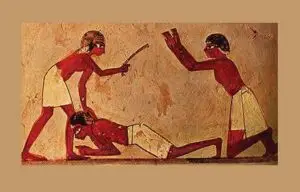The famous priestly blessing in Numbers chapter 6, verses 22-27, which forms an integral part of Jewish prayer to this day and is part of Christian liturgy as well, reads:
"May the Lord bless you and watch over you, May the Lord look kindly upon you and deal graciously with you May the Lord look with favor upon you and give you peace."
The Hebrew word “Shalom” is usually translated in English by the word “Peace.” A concept associated with the prophet Isaiah’s equally famous pronouncement:
And they shall beat their swords into plowshares. And their spears into pruning hooks: Nation shall not take up Sword against nation; They shall never again know war.
Isaiah 2:4
Nevertheless, the words of another prophet, Joel, are rarely compared..
Beat your plowshares into swords, And your pruning hooks into spears Let even the weakling say, "I am strong."
Joel 3:10
The prophet Joel is being ironic here. He parodies Isaiah’s utterance. This is because in Israel’s foundational literature, the TaNaKh, “shalom” is not reached by avoiding fighting.
In fact, in many places in the Hebrew Scriptures, the word “shalom” implies Israel’s deterrence over those nations who might threaten her.
“Shalom,” as Israel understands it, begins with diametrically opposed forces unable to prevail one upon the other.
Absence of strife, however, it is still not shalom.
Whereby one is not able to persevere upon the other, equilibrium is attained. By shunning utopian formulations not warranted by human experience, the TaNaKh talks uses realistic concepts.
“Shalom” is a Hebrew word derived from a root that denotes wholeness or completeness. The world desideratum, in Israel’s view, is the harmony resulting from opposing forces in tension, where one does not obtrude upon the other.
.


